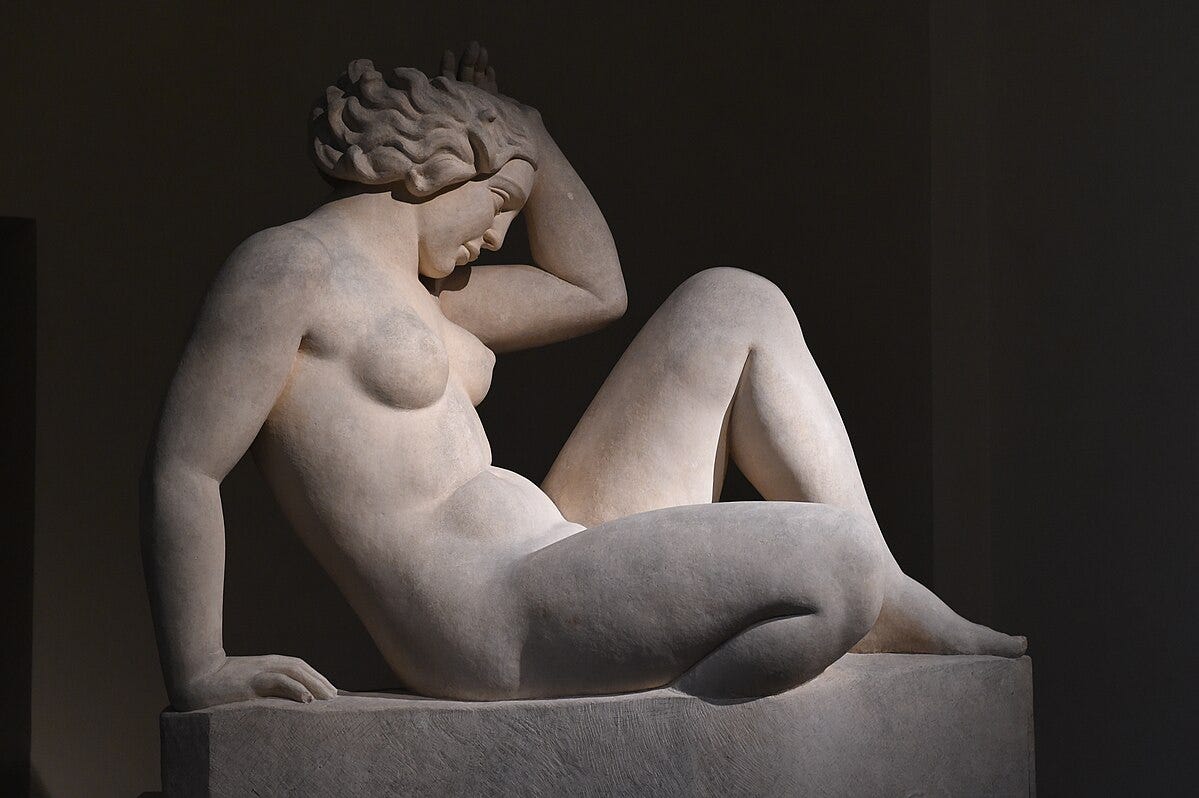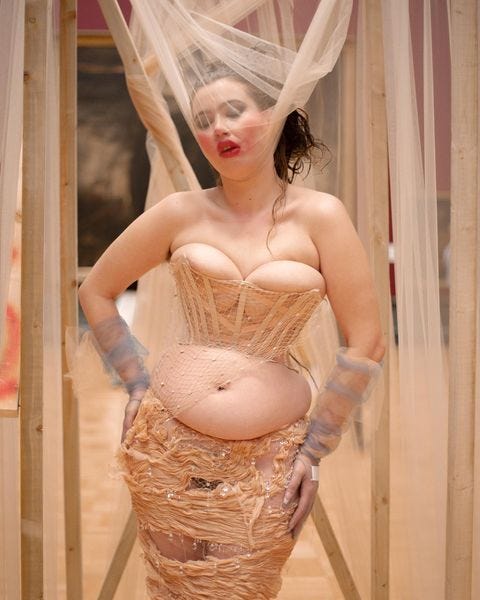What if I want my body to be interesting?
Responding to an increasingly common phrase.
Body Type brings you insights about body image and body culture from me, Mikala Jamison, an independent writer who’s been through big body changes and worked in the fitness industry.
I keep most of my posts free, but will be putting more behind the paywall in the coming months. Now’s a good time to upgrade if you like posts like this one. Just $4.17/month for an annual subscription helps me keep writing and building this community.💚
But! Please see the bottom of this post for an opportunity to get a comped paid subscription to Body Type for life.
In a recent post on Substack, its author wrote a sentiment that’s become popular over the past several years in body acceptance/anti-diet culture spaces:
“I want to feel like a person whose body is indeed the least interesting thing about her, by several orders of magnitude.”
“Your body is the least interesting thing about you” / “My body is the least interesting thing about me” are phrases that have grown in popularity alongside body acceptance movements and in eating disorder recovery spaces. They appear on merch all over Etsy and in graphics that bounce around Instagram. I know they’re well-intended and respect how they can help ease suffering in an image-obsessed culture, especially for those in eating disorder recovery. I also think, though, that their use has become such an easy way to signal allegiance to body acceptance et al. movements that people might feel they have to say and believe these phrases to be good stewards of those ideals.
For example, I found it strange when I saw the “least interesting” phrasing in an email last year from Meg Gallagher, a trainer “on a mission to get a barbell in every woman’s hands.” I follow Meg’s content and have used her training app (it’s very good, and I recommend it to beginners all the time).
Meg built a lifting empire from the ground up based on the idea that “buff is beautiful”; has executed a 300+ squat, 170-pound bench, and a whopping 400+ deadlift; and is flexing her glorious, colossal guns in our faces, but we’re meant to believe she thinks the look of the female body is necessarily the least interesting thing about it? Sorry, don’t buy it. Her business depends on her body being interesting in a particular way, and she wouldn’t have a body-based business if she didn’t think it was. This feels more like Meg saying the Good, Body-Positive Thing just to say it, and while I understand the inclination to do that and how it might soothe some of the anxieties of her customer base, I perceive a disconnect between her words and what are clearly her actions and values.
What if you don’t think your body is the least interesting thing about you? What if, in fact, you think it’s among the most? Does that suggest your allegiance to antiquated beauty and body standards, or diet culture, or thinness obsession?
Not necessarily.
Like Meg, what my body can do and how it looks because I’m a woman who lifts weights is a critical part of who I am. The appearance of my body at its most muscular represents the work I did to recover from an eating disorder and use strength training as a means of self-actualization — and after growing up at a time when women feared even the faintest musculature, it reminds me that I’ve come a long way from the days when I wanted to be a wisp with a thigh gap.
It’s interesting to me (and I like when it’s interesting to others, what can I say?) that I can pick 300 pounds up off the ground or throw 100 pounds over my head as a 35-year old woman who grew up in a culture where being and looking strong was essentially an aberration. I like looking like those are things I can do. It feels radical. It’s not the most interesting thing about me, but it’s certainly not the least.
This isn’t just about muscularity — people use bodies of all shapes and sizes as performance, as mechanisms for storytelling, as art:
The most spectacular burlesque number I’ve ever seen was performed by a very fat woman who lip synced to “Poor Unfortunate Souls” from The Little Mermaid. She practically tore the building down by the rafters in her Ursula drag. The sign language interpreter pretended to faint when she shimmied her breasts at him and dropped into a split. Her body was interesting because it rejected an idea of burlesque that, as dancer Lillian Bustle has said, still expects women to maintain an “idealized ‘showgirl’ body type.” That’s interesting!
Maybe what people mean by these phrases is more along the lines of a statement I once saw in a tweet: “I do think our bodies are super interesting parts of us, but NOT in the way they’re usually promoted!” Right. I’ll do you one better: “Thinness doesn’t have to be the most interesting thing about the female body.”
I can dig those, but I can’t get on board with the idea that the body is fundamentally uninteresting or irrelevant. If you say it about yourself, that’s your prerogative, but I take issue with you saying it about bodies in general.
If your work, or your art, or you sense of self is connected to your body as a major point of interest, I see no problem with that so long as you’re not hurting yourself or others, and so long as you’ve interrogated your values. My lack of interest in my own body, my dissociation from it, and my belief in its irrelevance is what contributed to the eating disorder that locked me in bodily despair for years. That I came to find it interesting and important is ultimately what saved me. Turns out when I thought of it as something worth consideration, I treated it better.
A note on voting:
With an organization called Vote Forward, I’ve been writing personal letters to potential voters in key states to encourage them to vote in this presidential election. In 2020, Vote Forward’s efforts led to an estimated 126,000 more votes. If you’re looking for a relatively easy (and in my experience, anxiety-lessening) 11th-hour action over the next week and a half, you can send letters until Oct. 29.
If you send letters — even just five, even just one — reply to this email with an image of them and I’ll comp you a paid subscription to Body Type as a thank you.
My feelings on this election, if they’re worth anything to you: If you believe, as I do, in bodily autonomy and reproductive justice, the only realistic choice1 is Kamala Harris. Despite her and her administration’s positions and actions with which I don’t agree2, and despite the shortcomings of the Democratic party in general (which are legion), I cosign what so clearly said here:
“I know that queer teenagers in Florida, pregnant women in Oklahoma, and union workers in Ohio are all better off under a Harris administration than a Trump one. Since we’re adults, however, we can acknowledge that truth while also calling out the deep, fundamental flaws in the Democratic platform, in the hope that through the exposure, those flaws will find a path toward correction.
[ …] As a Democrat, I have a much better chance of leveraging my vote to move Harris — my party’s nominee, the one who’s supposed to have liberal policies — to a better position on foreign policy, climate, and immigration than I do Trump, since we all know I was never going to vote for him in the first place.”
Read: The U.S. will have a new president on Jan. 20, 2025: Trump or Harris. A third-party winner is not a real option. I understand that voting for third-party candidates is a means of challenging the fundamentally broken two-party system. But as Robert Shapiro, professor of government at Columbia University, said in the Miami Herald: “[that] will not translate into political change unless political leaders interested in a third party organize such a party in all 50 states to compete successfully in state and local elections as well.” That is not happening in this election.







Interesting take on this "body neutral" phrase. When I first heard it, it really resonated with me. I think I'm an extremely interesting person aside from my body. I also feel the pressure to be "appealing" with my body, both from within and without, so this phrase eased some of that pressure. I see what you mean though, about how it doesn't quite fit as a blanket statement for all people. And while for me it is liberating, it could be diminishing for people such as yourself who have invested blood, sweat and tears into crafting an interesting body, not just a thin one. Mad props to you! Thanks for all you do.
I agree with this. I think bodies are fascinating. Without a body, what even are you?